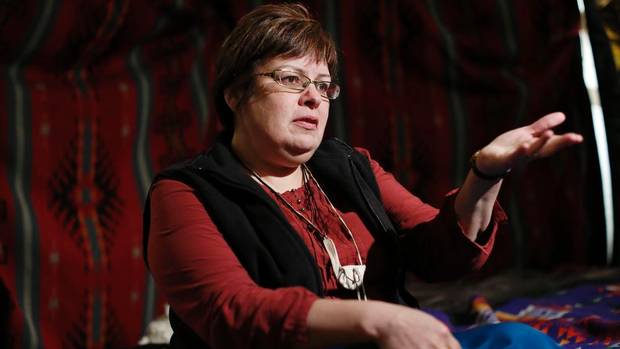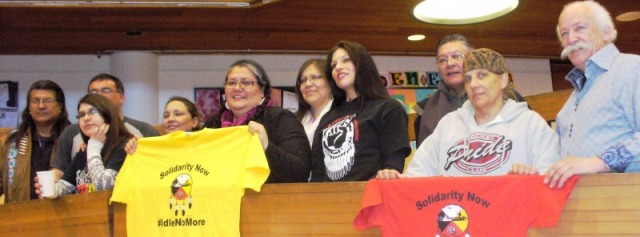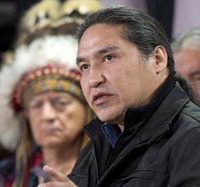idle_no_more_teaser
Call and join this conversation – 612-341-0980 – or Tweet us @TTTAndyDriscoll or post on TruthToTell’s Facebook page.
HELP US BRING YOU THESE IMPORTANT DISCUSSIONS OF COMMUNITY INTEREST – PLEASE DONATE HERE!
Here in the United States, the Canadian-originated Idle No More movement has had little mainstream media play, but spreading anger among Native communities of both countries over continued exploitation of what they maintain are indigenous lands – lands ceded to colonial powers in exchange for preserved protection of those lands for all future generations – especially that of the land, air and waters “and all creation.”
Canada’s Indians – called Aboriginals – comprising First Nations, Métis and Inuit peoples – initiated the Idle No More movement largely in response to Conservative Canadian Prime Minister Stephen Harper’s government rewriting of the critical Navigable Waters Protection Act (NWPA)of 1882, loosening built-in restrictions on “construction of any kind …(taking) place in or around any water which could, in principle, be navigated by any kind of floating craft. Under the newly-named NPA, the approval process would only be required for development around one of a vastly circumscribed list of waterways set by the Minister of Transportation. Many of the newly deregulated waterways passed through traditional First Nations land.” (Wikipedia entry on Idle No More – for a much more detailed explanation of this campaign).
Needless to say, navigable waters salt the whole of the Canadian landscape, giving the NWPA more importance for First Nations as an instrument of environmental protection – but which would be gutted and many protections removed under Harper’s C-45 bill – a 450-page part ofso-calleed Omnibus bills package to smooth the way for much more industrial development.
In fact, as First Nations people see it, the NPA rewrite has legitimized one of the great and egregious violations of indigenous sovereignty over those protections has been the Canadian Government’s “…campaign for approval of the Enbridge Northern Gateway Pipelines Project, a proposal to build a pipeline for bitumen condensate connecting the Athabasca tar sands with the Pacific Ocean, facilitating unprocessed bitumen exports to China.” (Ibid.)
This is the origin of infamous Keystone Pipeline – now familiar to US residents, not to mention the American Indian community in solidarity with their Canada-based brothers and sisters. (The US and Canada are not precisely recognized as separate countries under the concept of indigenism and the designation of all North America as Turtle Island – home to all Native peoples in this hemisphere.)
Idle No More is leading the protests over tar sands oil development and the shipment of this expensively extracted crude oil down through the US by way of the Keystone Pipeline.
Even though the Senate overwhelmingly approved the pipeline in the early hours of Saturday’s marathon budget session with a mixture of Republican and vulnerable Democratic incumbents in 2014, President Obama has held off on his approval of the Keystone which would traverse the Dakotas and other Midwestern states. (It’s possible the lame duck President will not approve, letting those Dems off the hook in both left and right camps.)

The Idle No More movement has been inspired in large measure “…by the liquid diet hunger strike of Attawapiskat Cree Chief Theresa Spence and further coordinated via social media. Solidarity sessions have sprung up throughout Canada and the US, including last Friday’s symposium in Minneapolis’ American Indian Center on these issues and featuring many speakers connected not only to resisting the Keystone pipeline and tar sands oil extraction in general, but by others battling other environmental threats, one of which we have covered extensively – the introduction of sulfide mining – copper and nickel – in Minnesota’s North Country and newer iron ore mining operations sought for the Penokee Mountains of Northern Wisconsin.
 Attawapiskat Grand Elder Ray Robinson, far left, Nina Wilson (with yellow shirt), Marty Cobenais (right behind)
Attawapiskat Grand Elder Ray Robinson, far left, Nina Wilson (with yellow shirt), Marty Cobenais (right behind)
Under the top layers Northeastern Minnesota lands and lakes – much of it part of areas ceded but still protected against fouling by treaties over century-and-a-half old – lies a large and rich lode of those precious metals, extraction of which could turn the waters of the entire area to sulfuric acid and kill off the lakes we all deem precious and Indians consider sacred for their Manoomin (wild rice) stands.
The issues are many and complex – often colliding with corporate and governmental powers now seen as an extension of the persistent colonialism around Native lands and peoples in both countries. – aided and abetted by state and local politicians under duress from labor unions trying to rekindle a job market for miners and related craftsmen long idled (pardon the pun) by the Great Recession of 2008 and their slow or stagnant growth in employment opportunities.
Of course, the same can be said of Indians residing throughout those same areas. State legislators from the Iron Range and DFLers still reliant on labor support for reelection have joined with mining companies and the Departments of National Resources and the Pollution Control Agency to advance Minnesota’s exploitation of those resources for jobs and the billions awaiting those companies under the crust and cover of lands up north.
Idle No More was initiated by activists Nina Wilson, Sheelah Mclean, Sylvia McAdam and Jessica Gordon. While no one personality is leading the movement, these women and their supporters are traveling around. The idea’s caught on and the name usurped as the basis for political action at many levels – right down to a high school in Minneapolis.
TTT’s ANDY DRISCOLL and MICHELLE ALIMORADI talk with leaders of the movement – locally and internationally – about the successes and the struggles of Turtle Islanders to preserve the environmental integrity of their lands and waters under the Idle No More rubric – and how the contagion of solidarity is taking hold.
NINA WILSON (Ojibwe) – Saskatoon, Saskatchewan; Co-Founder, Idle No More
RAY ROBINSON (Cree/Anishinaabe) – Grand Elder from Quebec
PATRICIA SHEPARD, MSW (Prairie Band Potawatomi/Ojibwe), Minneapolis, founder of the Native Youth Crisis Hotline; Honor the Youth Organization Project Coordinator.
WINONA VIZENOR (Ojibwe) – South High School Student – Minneapolis



